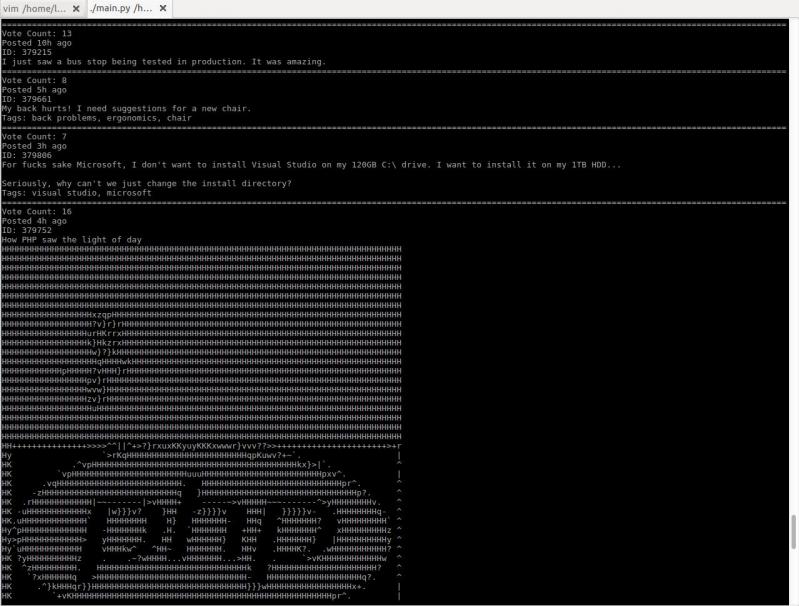Ranter
Join devRant
Do all the things like
++ or -- rants, post your own rants, comment on others' rants and build your customized dev avatar
Sign Up
Pipeless API

From the creators of devRant, Pipeless lets you power real-time personalized recommendations and activity feeds using a simple API
Learn More
Comments
-
@-ANGRY-CLIENT- As much as I love docker, not everyone provides configs for it, and putting a random tool in a container seems to just shift the problem, I'd be getting docker errors about required path includes and not finding the right nvidia cuda runtime etc...
-
I have. But usually it's just a shit ton of debugging. Especially when having 2.7 and 3 installed at the same time because of some shit application that needs 2.7
-
@AlexDeLarge Somehow, Python devs also seem to be of the special lazy kind when it comes to documentation and readmes, assuming that everyone has libpoop 5.4 installed, like they had while testing the code.
People joke about NPM and resulting directory size, but when you install dependencies from a lock file you at least know everything is exactly as it should be.
Python applications tend to use libs from OS repos, but every distro has its own package manager and ideas about version stability.
So in my opinion, if you write a Python script/application there should at the very least be a readme with a list of dependencies and versions. -
Ah, another rant about how bad installing stuff for python is
May I ask you what were you trying to install?
And to answer your question - I have, almost always.
Edit: I see you're using apt to install it xD -
@YourNemesis A lot of random ML experiments and Jupyter stuff used in different departments in the company. And most recently Kitty, an extremely good terminal emulator once you are done hunting down & compiling dependencies.
-
@bittersweet For ML related stuff you can have a look at anaconda. It mostly has all the things required. If you don't feel like using anaconda, major ML libs like tf, keras do provide wheels which makes the installation a piece of cake.
About the point you mentioned in one of the comments above that python uses OS libs is simple to solve as well. Have a look at tools like pyenv or pipenv which create virtualenvs(you can create virtual env without them as well. `python3 -m venv <venvname>`) so that doesn't interfere with the OS wide installation. I almost always use a virtualenv for each new project. -
@bittersweet if it's a tool, something like a terminal emulator, which you don't want to use as a lib. You can ask the developer to provide binaries. Pyinstaller does a pretty good job at converting py packages into a single executable
-
@YourNemesis Yeah I mostly use anaconda.
The problem is not really on my side though.
As powerful as the language is, the python community is deeply divided. I'd call the dozens of distributions like anaconda not a solution, but a symptom. Same for virtualenvs... Another tool layer solves 9 issues, but causes 5 others.
Every JS project just says "run npm install and have fun". Rust has crates, PHP has composer, Ruby has gems, etc
Python... Tells you to use egg or pip or wheel or poetry, then the pip in your path is the wrong version, etc.
A language should not generate articles like "which package manager is right for me and my project". As much as I love Haskell and Go as languages, they suffer from similar tooling problems.
As easy as the language is, the tools can be fucking frustrating. I've never NOT succeeded in running a project, but it's always a bit messy. -
 Axis8096yLooks like you guys haven't heard of https://github.com/pypa/pipenv I generally dont have the problems you are referring to and when I do usually one the messages is pretty straightforward. However pipenv definitely creates stability for the dependency process
Axis8096yLooks like you guys haven't heard of https://github.com/pypa/pipenv I generally dont have the problems you are referring to and when I do usually one the messages is pretty straightforward. However pipenv definitely creates stability for the dependency process
Related Rants


 No questions asked
No questions asked As a Python user and the fucking unicode mess, this is sooooo mean!
As a Python user and the fucking unicode mess, this is sooooo mean! I just started working on a little project to browse devrant from terminal. It converts images to ascii art!
I just started working on a little project to browse devrant from terminal. It converts images to ascii art!
sudo apt-get random-tool
Traceback (most recent call last):
Aborting because there's a fork in the spoon compartment on line 43 in main
Error this script only works on Python 2.7 and maybe 4.1 on line 59 in main
Missing symbols when trying to decipher Sumerian recipe for steamed vegetables on line 67 in main
Cannot open shared object: Your OS is a bully and is hiding my files on line 98 in main
Are you sure all directories matching ^(/)?([^/\0]+(/)?)+$ are in your $PATH on line 268 in main
Your computer is kind of vibrating in an annoying way on line 332 in main
Failing because I'm feeling insecure please hold me on line 587 in main
I'm feeling confused about my sentience when running TensorFlow models on line 682 in main
FUCK
HAS ANYONE EVER MANAGED TO JUST FUCKING INSTALL A PYTHON BASED APPLICATION WITHOUT DEBUGGING RANDOM COMPUTER STATE SHIT AND DEPENDENCIES FOR THREE HOURS?
rant
python